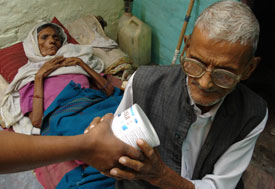Building the capacity to battle cancer
September / October 2011 | Volume 10, Issue 5

Photo by Dr. D. P. Singh/Photoshare
At current rates, the incidence of cancer will rise
to 21.4 million cases worldwide by 2030.
Fogarty research training programs seek to build
capacity in developing countries to improve the
diagnosis and treatment of the disease.
By Steve Goldstein
Mammograms are commonly used to screen for breast cancer in the United States, but are not widely practiced in many countries.
Most Latin American women don’t take advantage of the screenings, even when they’re offered for free. Dr. Beti Thompson of the Fred Hutchinson Cancer Research Center in Seattle wanted to find out why. She’s using a Fogarty International Research Collaboration Award to study how health care workers in Chile can increase the number of women who have mammograms. Since breast cancer is the most common cancer among Chilean women and has a high mortality rate, it’s not a trivial issue.
Thompson and her team used a randomized trial of 500 women to test three interventions. All women received screening information verbally from their general practitioners, some received follow up information by mail and some received the mailed information with an additional telephone call or home visit.
After six months, it was clear screening behavior increased dramatically with enhanced contact, Thompson reported. In the group that only received verbal information, merely 6 percent of women had a mammogram. But about half the women who received a follow up mailing were screened and 70 percent who received both the mailing and a phone call or home visit underwent mammograms.
Screenings are just one of the cost-effective interventions available across the four broad approaches to cancer prevention and control: primary prevention, early detection, treatment and palliative care. For years Fogarty has worked to attack cancer through its tobacco initiative and more recently through its NCD Lifespan and Medical Education Partnership Initiative programs.
According to the WHO, even if current global cancer rates remain unchanged, the estimated incidence of 12.7 million new cancer cases in 2008 will rise to 21.4 million by 2030, with nearly two thirds of all cancer diagnoses occurring in low- and middle-income countries.
In Brazil, Fogarty grantee Dr. Eduardo M. Tarazona-Santos of the Universidade Federal de Minas Gerais is working to determine Latin America’s genetic susceptibility to gastric cancer, the second highest cause of cancer deaths in the region. Gastric adenocarcinoma is associated with the high prevalence of infection with the type 1 carcinogen Helicobacter pylori, often found in developing countries. Supported by Fogarty and the National Cancer Institute, Tarazona-Santos is studying the genetic history of gastric cancer patients and controls in Lima, Peru and Rio de Janeiro, Brazil. Preliminary results have been published.
Inflammatory Breast Cancer (IBC) is of clinical importance because it is found disproportionately in young women and has a high incidence in Egypt. Supported by a Fogarty International Research Collaboration Award, Dr. Bonnie F. Sloane of the Wayne State University School of Medicine in Detroit is helping to build a high caliber cancer biology research program in Cairo, focused on IBC.
Few students are trained in state-of-the-art research techniques in Egypt, so a major component of the partnership is training postgraduate Egyptian students both onsite and in the lab and research cores at Wayne State and the Karmanos Cancer Institute in Detroit. One trainee, Eslam El-Ghonaimy, spent five weeks this summer working at Karmanos learning several specialized culture and live-cell imaging techniques, a new area of research in Egypt.
Preliminary results suggest that the immune system may contribute to the unique phenotype of IBC patients. The collaborators hope to identify druggable pathways that can be targeted for new therapies. Findings have been presented at conferences in Cairo and Saudi Arabia. Sloane said that Fogarty “provided us with key financial support and served as evidence that our collaborations were recognized internationally.”
Finally, in Morocco, where the cancer burden is increasing, Dr. Anna R. Giuliano of the Moffitt Cancer Center in Tampa, Fla., is using a Fogarty Non-communicable Chronic Diseases Research Training Program grant to systematically assess training needs in Morocco and to develop a cancer research training program. Among the partners are the Colleges of Medicine and Pharmacy at the University of Fez and Marrakesh.
More Information
To view Adobe PDF files,
download current, free accessible plug-ins from Adobe's website.